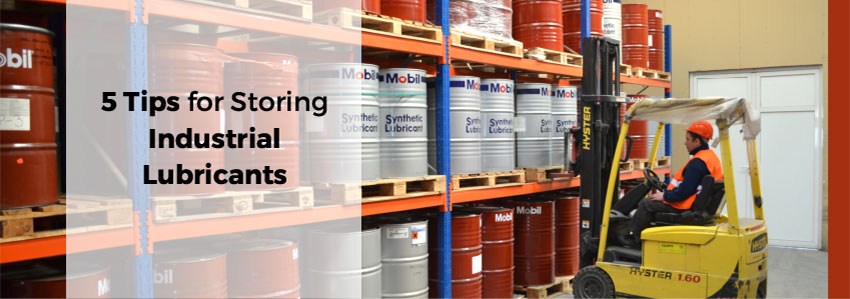5 Tips for Storing Industrial Lubricants
 5 Tips for Storing Industrial Lubricants
5 Tips for Storing Industrial Lubricants
The storage of the industrial lubricants is both a safety issue and a profitability issue. In any domain where proper lubrication of mechanisms and equipment represents a priority, it is important to use synthetic products of the highest quality. But it is not enough to use high performance oils and greases to minimize your costs and maximize production potential.
How industrial lubricants storage is made is also very important. If synthetic lubricants are kept in unsuitable conditions, they are subject to numerous risks, like package deterioration and leakage, exposure to temperatures that are too high or too low, mixing different types of oils, exposure to dust or chemicals that cancel their properties and many more.
It is therefore important that lubricants are stored correctly. You do not know how you could improve this process? See some useful tips in the list below:
1. Make sure you have a room specifically designed for lubricants storage
When the maintenance equipment and tools are kept separately, the risk of damaging any of these elements is significantly reduced. In the case of lubricants, organizing them, monitoring them and keeping their quality for as long as possible can be easily made.
Such a room must be indoors, and sufficiently spacious to accommodate all the necessary containers. Also, it should contain notice boards with important announcements related to the lubricants’ use, instructions and tables to be filled in with data related to the use of the lubricants and greases.
2. Optimize the lubricants storage containers
In the industrial environment, there are often used more than one type of lubricant or grease due to the complexity of the equipment used. To make it easier to recognize them and avoid the sometimes inevitable mistakes of employees, it is important to store these products in containers of different colors, mentioning on them the most important data about the products.
Another optimization method is to find ideal solutions to extract lubricants from containers in order to prevent product leakage, and to give employees the ability to work safely.
3. Optimize the lubricants reception process
If you often discover that the lubricants you use have been mixed or contaminated with various substances, then you should pay more attention to the process of receiving and placing the product in the storage area. Make sure all containers have essential information about the product they contain and that your employees know the procedures you want to be followed. Thus, upon the receipt of new quantities of industrial lubricants, they should be properly stored, without risks.
4. Perform quality control tests
In many cases where lubricants are altered in the industrial environment, the main reason is the lack of a comprehensive inspection of incoming products. To avoid such situations, it is recommended to perform a stock control before the arrival of new quantities, as well as a control regarding the quality of additives and their concentration and performance properties using simple analyses of the oil. After controlling the quality of the oils, they can be transferred to the storage space.
5. Monitor the period of use of the lubricants on the shelves
When lubricants are stored in large containers, the equipment and the machines are greased using smaller tools, such as guns specially designed for this purpose. Usually they are kept on shelves placed in the same room as the larger containers.
One of the experts' advice is to use guns or canisters by the First-In, First-Out (FIFO) method in order to make sure that no container is left unused for a long period of time in favor of others and that it does not reach the expiration date specified by the manufacturer. This method involves using the containers that were put on the shelf first before those that were put later.
The above tips are designed to help you maximize productivity, internal organization and reduce costs in the long term. Leaving these aspects aside, they also helps you take precautions in terms of employee safety.
For more tips and information, click on the image below and contact a Star Lubricants representative. They will be able to answer your questions related to the storage of industrial lubricants.







